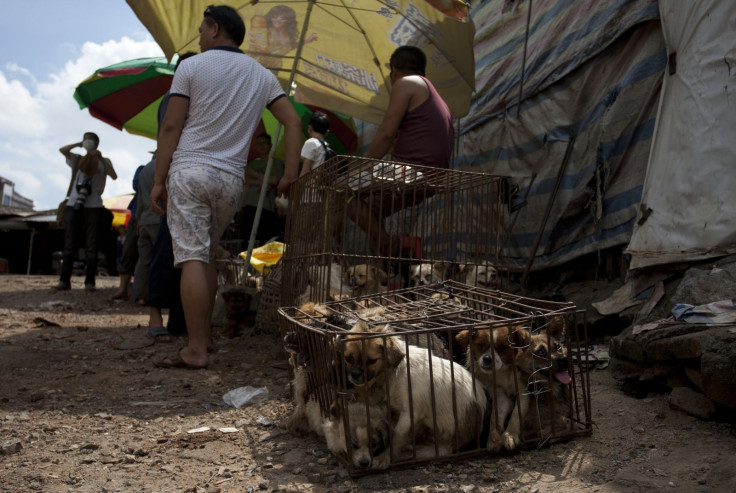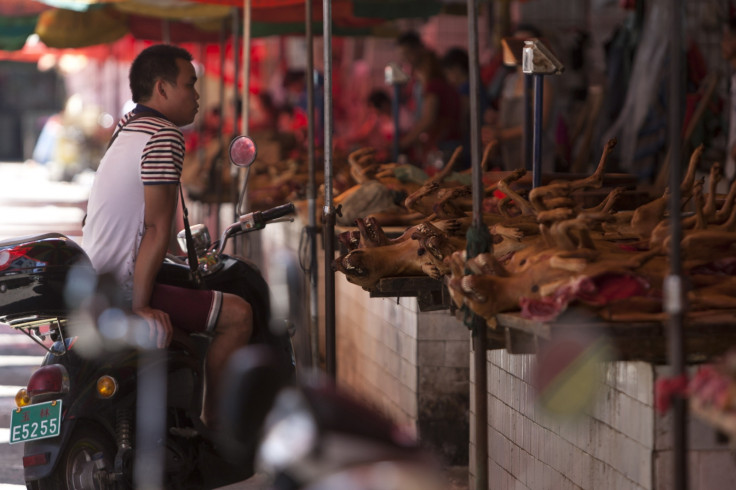Yulin dog meat festival: Why thousands of dogs are slaughtered over the summer solstice in China
The festival sees tens of thousands of dogs killed for their meat
Tens of thousands of dogs are set to be killed and eaten at this year's Yulin Dog Meat Festival held in southern China in June 2016. Despite protests to boycott the annual event by human rights activists, up to 15,000 animals are expected to be slaughtered during the summer solstice event.
Ahead of the festival, IBTimes UK looks at the origins of the festival - and why it has become so controversial.
What is the Yulin Dog Meat Festival?
The Yulin Dog Meat Festival, otherwise known as the Lychee and Dog Meat Festival, is an annual event during which dogs and cats are sold and slaughtered for their meat. It takes place on 20 June in Yulin, a city in China Guangxi Zhuang Autonomous Region. The tradition reportedly began in the 1990s, but the festival is thought to have begun in 2010 to mark the astronomical midsummer.
While Westerners often react in outrage to the idea of eating man's best friend, the Chinese tradition of eating dog meat dates back to around 500 years. According to Chinese lore, eating dog meat is believed to ward off the heat of summer and bring good luck and health.
Selling dog meat for human consumption is legal in mainland China. According to the Humane Society International, a charity which campaigns to end the Yulin festival, more than 10 million dogs are killed for human consumption every year in the country.

Why is it controversial?
Although eating dog meat is a cultural phenomenon in China, critics say there is little cultural value in the Yulin festival and it was launched as a way of making money in the relatively poor region.
The festival has also been condemned for the alleged cruel treatment of animals. The Humane Society International alleges many of the dogs are stolen pets captured and transported over long distances in crowded cages without food or water. Videos and photographs taken during the festival show dogs and cats in small cages. Some are shown to be wearing collars, which suggests they were stolen pets. Critics claim the animals are killed in a brutal fashion and beaten to death or cooked while still alive, allegedly for the taste of adrenaline-soaked meat.
Kelly O'Meara, director of companion animals and engagement for HSI, said: "China's dog meat trade, and in particular the Yulin dog meat festival during which thousands of dogs are abused and slaughtered for their meat during the summer solstice, are immensely cruel and deserving of global attention."
What about double standards?
There has also been criticism of western values and cultural bias when it comes to the issue of dog meat. Although many westerners don't think twice about eating chicken or lamb or the conditions in which they are killed, slaughtering dogs for meat causes moral outrage.

In an editorial for the Guardian published last year, the philosopher Julian Baggini argues the "double standards at play here are numerous, complicated, and not always obvious" and "moral outrage is always easier when the target appears to be far from home". Baggini argues more - or at least equal - attention should be paid to abattoirs in the West.
What are the health concerns?
Aside from allegations of extreme animal cruelty, the World Health Organisation has raised concerns over the safety of the meat sold and consumed during the Yulin festival. The dogs are transported in large groups over long distances in poor and unsanitary conditions, allowing disease and sickness to spread. China's food safety administration has banned selling meat from animals in these conditions.
While the eating of dog meat does not cause rabies, the handling and slaughter of large numbers of unvaccinated dogs exposes traders to rabies infection. In 2008, the WHO raised awareness of the trade in dog meat as a contributing factor in the spread of rabies in Indonesia, as some dogs are believed to be transported from unknown sources across long distances, which allows disease and sickness to spread among the animals. The long-distance transportation of large numbers of dogs for their meat has also been linked to outbreaks of rabies in China and Vietnam.
China's ministry for public health has previously warned Guangxi province, where Yulin is located, has the largest number of cases of human rabies in China.

© Copyright IBTimes 2025. All rights reserved.




















